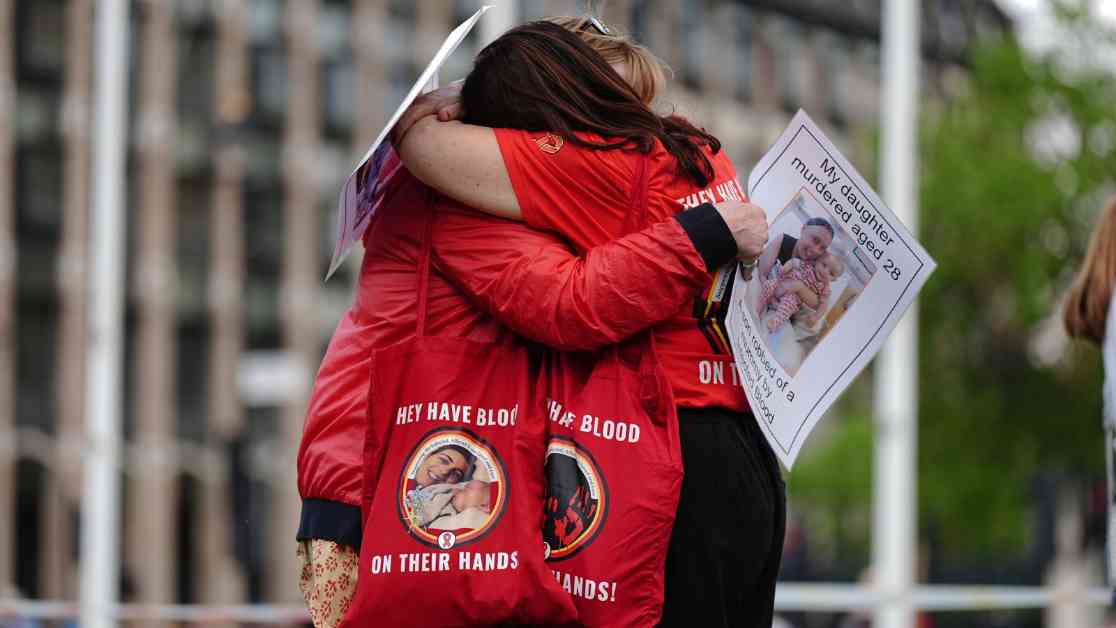Victims of the infected blood scandal in the UK are set to receive lifelong financial support as confirmed by the government, marking a significant step towards rectifying the devastating consequences of the crisis. The updated multi-billion-pound compensation scheme aims to provide ongoing assistance to those affected by the scandal, including additional payments for individuals subjected to unethical research practices. This development comes in the wake of the long-awaited report from the Infected Blood Inquiry, which exposed the systemic failures that led to over 30,000 individuals contracting HIV or hepatitis through contaminated blood and blood products in the 1970s and 1980s, making it one of the most tragic treatment disasters in the history of the NHS.
### Government’s Commitment to Lifelong Support
The government’s announcement of regular support scheme payments for victims of the infected blood scandal, including bereaved partners, continuing for life signifies a crucial acknowledgment of the ongoing impact of the crisis. The commitment to provide financial assistance to both living and deceased individuals affected by the scandal through the new compensation framework is a significant step towards addressing the deep-rooted issues stemming from the tragic events of the past. The Cabinet Office has outlined that payments under the new scheme will commence by the end of this year for infected individuals, with those affected by the scandal expected to start receiving support in 2025.
### Compensation for Unethical Research Victims
In a poignant recognition of the injustices faced by victims of unethical research practices during the infected blood scandal, the government has announced additional payments for those identified by the Infected Blood Inquiry. Individuals who were subjected to unethical testing without their knowledge, as highlighted in the report, will receive a supplementary £10,000 payment. Moreover, for individuals who underwent treatment as children at Lord Mayor’s Treloar’s College in Hampshire, where egregious cases of unethical testing took place, the compensation amount will be increased to £15,000. The harrowing accounts of pupils at the school being treated with plasma blood products infected with HIV and hepatitis underscore the grave consequences of medical negligence and exploitation that characterized the scandal.
### Personal Testimonies of Survivors
Richard Warwick, a former pupil at Lord Mayor’s Treloar’s College who was infected with HIV and Hepatitis C, expressed mixed feelings about the compensation amounts, emphasizing the emotional and psychological toll on victims and their families. Warwick described the £15,000 figure as “derisory and insulting,” reflecting the deep-seated trauma and loss experienced by those impacted by the scandal. Another survivor, Stuart Mclean, shared his journey of discovering his Hepatitis C infection years after receiving unnecessary treatment as a child, highlighting the need for clarity and recognition of the complex health issues faced by survivors. The personal testimonies of individuals like Warwick and Mclean shed light on the enduring challenges and uncertainties surrounding the infected blood scandal.
### Addressing Systemic Failures and Ensuring Justice
The compensation updates announced by the government are based on recommendations put forth by Sir Robert Francis KC, interim chair of the Infected Blood Compensation Authority, in response to the shortcomings of existing compensation plans. By accepting the majority of the recommendations from the independent review, the government aims to rectify past injustices and provide a pathway to justice for victims and their families. The establishment of additional routes for victims to apply for compensation, including personalized applications for individuals with unrecognized health conditions, signifies a commitment to addressing the diverse needs of those affected by the scandal.
### Understanding the Infected Blood Scandal
The infected blood scandal, which unfolded between the 1970s and 1990s, saw over 30,000 individuals infected with deadly viruses while receiving NHS care, highlighting the catastrophic consequences of inadequate blood screening protocols. The reliance on imported blood products, particularly Factor VIII used to treat hemophilia, sourced from high-risk groups without proper testing procedures led to widespread contamination and subsequent infections. The lack of testing for HIV and Hepatitis C until the mid-1980s and early 1990s respectively exacerbated the crisis, causing irreparable harm to thousands of individuals and their families.
### Moving Towards Healing and Accountability
Paymaster General and minister for the Cabinet Office, Nick Thomas-Symonds, emphasized the government’s commitment to delivering timely compensation and support to victims of the infected blood scandal, acknowledging the profound impact of the crisis on countless lives. While recognizing that no amount of compensation can fully address the suffering endured by victims, Thomas-Symonds underscored the importance of driving cultural changes to prevent similar tragedies in the future. Legal advisor Des Collins, representing over 1,000 victims and families affected by the scandal, welcomed the compensation updates while highlighting the need for clarity and transparency in the application process to ensure equitable distribution of support.
### Conclusion
The government’s decision to provide lifelong financial support to victims of the infected blood scandal represents a significant step towards acknowledging the injustices and hardships faced by those impacted by the crisis. By addressing the systemic failures that led to the contamination of blood products and the subsequent infections, the government aims to pave the way for healing, accountability, and justice for victims and their families. The compensation updates, guided by recommendations from the Infected Blood Compensation Authority, signal a renewed commitment to rectifying past wrongs and ensuring that the legacy of the infected blood scandal is one of remembrance, resilience, and meaningful change.












